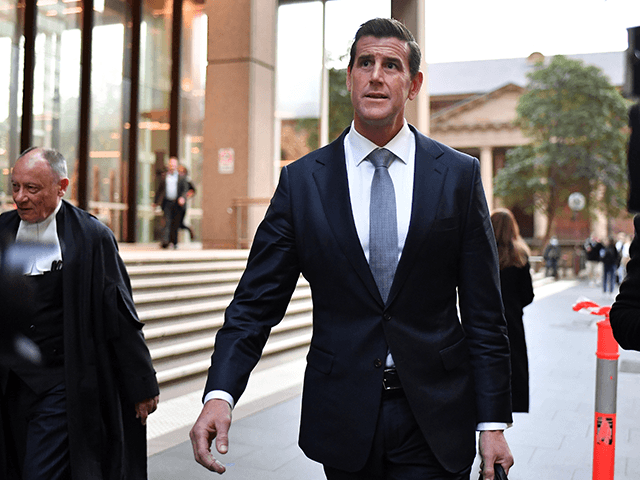Australian Special Air Services Regiment (SAS) veteran Ben Roberts-Smith, the most decorated living Australian service member, opened his defamation case on Monday against the Sydney Morning Herald, The Age, and the Canberra Times for libeling him with allegations of war crimes committed during his tours in Afghanistan.
Roberts-Smith, 42, received the Victoria Cross – his country’s highest honor for military service – for “most conspicuous gallantry in action of great peril” while serving in Afghanistan in 2010. He was engaged in a helicopter assault to capture a senior Taliban commander when his unit came under heavy fire from entrenched enemy forces. By all accounts, Cpl. Roberts-Smith stormed the enemy position without any regard for his personal safety, took control of an enemy machine-gun position, and then kept going, allowing his unit to drive Taliban forces out of the area.
Roberts-Smith was also awarded a Medal for Gallantry for his actions as a scout and sniper while under heavy fire from a much larger enemy force in 2006.
In the summer of 2018, the three newspapers taken to court by Roberts-Smith – all owned by the Fairfax Media corporation – ran a series of articles alleging abusive behavior by a rogue group of Australian soldiers in Afghanistan.
The articles included war-crimes allegations such as Roberts-Smith purportedly kicking a handcuffed Afghan prisoner off a cliff and then ordering his summary execution while he lay in a gully with his teeth knocked out. In another incident, Roberts-Smith and other soldiers were accused of killing an Afghan man and then drinking beer out of his prosthetic leg. The newspaper series also claimed Roberts-Smith was cheating on his wife and committed domestic assault against his mistress.
Roberts-Smith filed his libel suit soon after the publication of these articles, denouncing their allegations as “false,” “baseless,” and “completely without any foundation in the truth.” The trial commenced Monday after two and a half years of preparations and pre-trial legal maneuvers.
The defending newspapers say their articles were extensively researched by two of Australia’s top investigative reporters, and argue some of the allegations Roberts-Smith interpreted as libelous statements against him did not name him as the perpetrator.
According to court testimony Monday, the newspapers accused Roberts-Smith of six murders in Afghanistan. His lawyers noted that one allegation of an unlawful killing has already been withdrawn by the defendants. Roberts-Smith claims the incidents in which he was portrayed as mercilessly executing helpless prisoners were actually combat fatalities incurred while he was engaging armed and hostile enemies.
“This is a case of courage, devotion to duty, self sacrifice and, perhaps most important of all, surpassing skill in soldiering on one hand. On the other hand, it’s a case about dishonesty, corrosive journalism, cowardice and lies … led by bitter people, jealous of [Roberts-Smith’s] courage and success, aided by credulous journalists,” said his barrister Bruce McClintock, as quoted by the UK Guardian on Monday.
McClintock said some of the lurid material used against Roberts-Smith by the newspapers was given to them by soldiers who were “confused, mistaken, or have false memories” due to the “almost inhumane” demands made on them during their Afghanistan deployments. He added that some of the accusers were “failed” soldiers looking to bring down Australia’s most decorated veteran.
“Being thought of as a failure as a soldier has a corrosive effect on a person,” McClintock said.
Roberts-Smith’s legal strategy includes what the Australian Financial Review (AFR) characterized on Monday as the “Breaker Morant defense,” a reference to Lt. Harry Morant, a famed Australian soldier accused of war crimes during Australia’s first – and notoriously brutal – counterinsurgency campaign during the Boer War. Morant was ultimately executed by a British firing squad in 1902 for allegedly murdering 12 prisoners of war, but over the ensuing decades became a folk hero, seen by many Australians as a convenient “colonial” scapegoat for orders given by British officers.
The “Breaker Morant defense” described by AFR boils down to arguing that civilians with incomplete or false information are second-guessing the difficult actions taken by soldiers involved in a brutal struggle against an enemy that blends into civilian populations and prefers to attack by ambush and terrorism. AFR suggested comparisons with the Morant case are apt because the government is investigating Roberts-Smith and other Australian soldiers for their actions in Afghanistan, so the outcome of his defamation case against the media could have significant repercussions on any future prosecution.
Another angle to the case is that since leaving the military, Roberts-Smith has taken a position as general manager for Seven, a network rival to Fairfax Media. The Sydney Morning Herald (SMH), one of the defendants in the lawsuit, noted on Saturday that his employer Kerry Stokes is “firmly in the war veteran’s corner, bankrolling the legal action with a loan to Roberts-Smith from Stokes’ private investment company Australian Capital Equity.”
“Stokes, a noted collector of military memorabilia, is also chair of the Australian War Memorial and has close ties to the SAS, which is headquartered near his home town of Perth,” the SMH added.
The case is Ben Roberts-Smith V. Fairfax Media Publications, case number NSD1485/2018 with the Federal Court of Australia, New South Wales Registry.

COMMENTS
Please let us know if you're having issues with commenting.